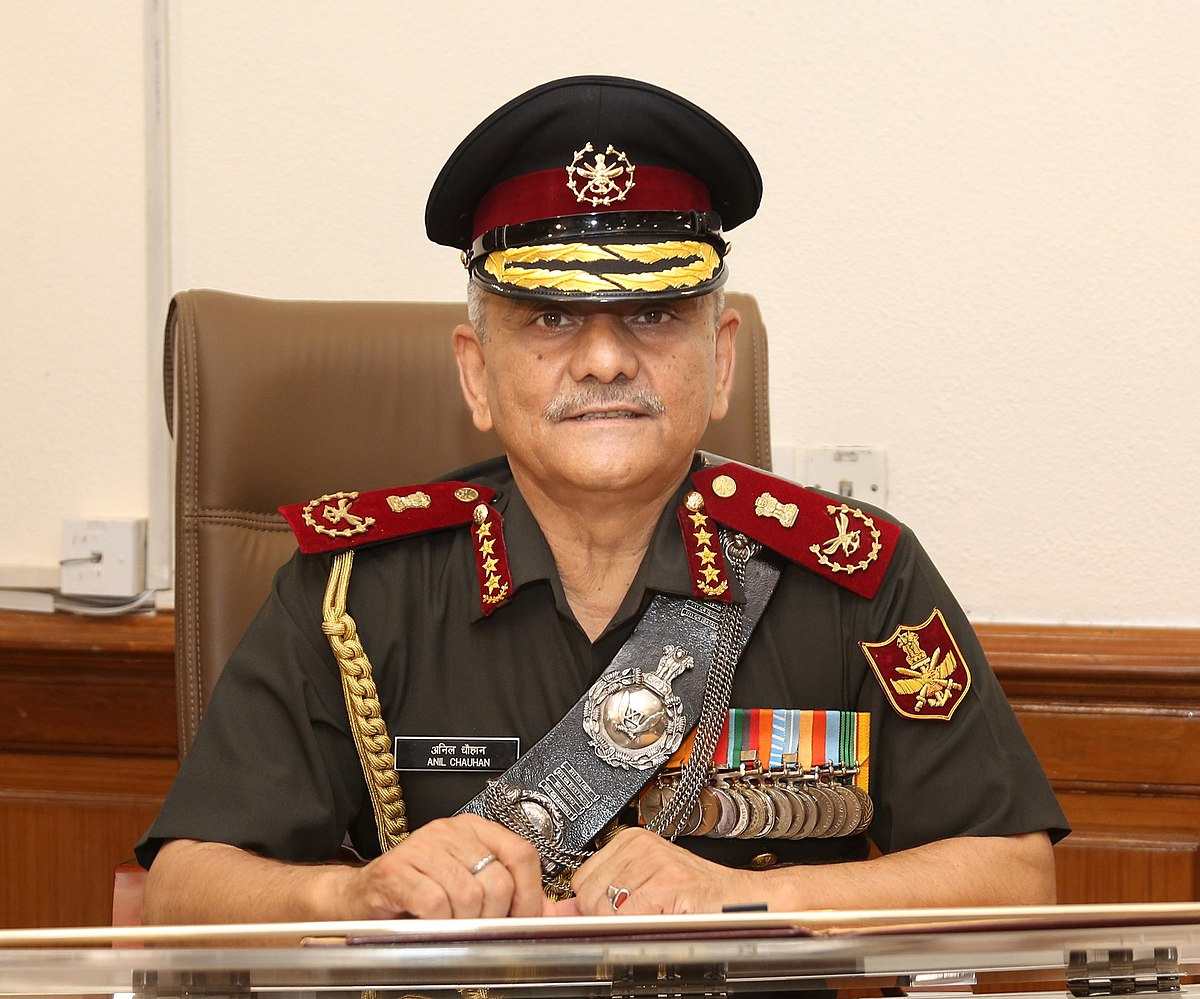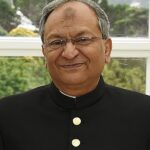By Ambassador Afrasiab Mehdi Hashmi Qureshi
General Anil Chauhan presently leads the Indian military. He is serving as Chief of Defence Staff (CDS) of the Armed Forces of India, comprising the Army, Navy, and the Air Force.

Being the senior-most, all three services chiefs, i.e., Army Chief General Upendra Dwivedi, Air Chief, Air Chief Marshal Amar Preet Singh, and Naval Chief Admiral Dinesh Kumar Tripathy, are required to coordinate with him on all important matters relating to the defense of India.
Anil Chauhan joined the Indian Army in 1981. After having served with distinction for around 40 years, he retired as a Lieutenant General in 2021.
Later in Sept 2022, Anil Chauhan was brought back into the armed forces after retirement. He was given the rank of a full General and appointed the Chief of Defence Staff of India.
General Chauhan was in command of the Indian armed forces when India attacked Pakistan in May 2025.
Appointing a retired military officer to a top CIVILIAN post related to the defense forces of a state is not uncommon. But to re-appoint a retired military man as a regular officer in the Army and give him the rank of a full General when he had already retired as a Lieutenant General is not common. More so, in the subcontinent. Once you retire, you retire. You do not rejoin the Army in full military uniform, with a promotion.’
Previously, the services chief who served as CDS was General Bipin Rawat. Unfortunately, he died in a helicopter crash in December 2021.
In 2022, the BJP government modified the rules, allowing the appointment of even a ‘Retired 3-Star or 4-Star General’ to the important position of CDS.
The intention was to have a person as head of the armed forces who was ‘more amenable’ to the directives of the political leadership in New Delhi. This was a highly unprofessional decision, which has implications. It carries repercussions for the armed forces of India.
Looking back would also be important.
The interaction between the Government and the Army in India has been interesting. In several cases since independence, the top political leadership in New Delhi, felt uncomfortable with the military chiefs.
The first Deputy Prime Minister of India, Sardar Patel, habitually insulted senior officers of the Indian armed forces. So did Krishna Menon, when he was the Defense Minister.
On his part, Prime Minister Jawaharlal Nehru had difficulty with his Army Chief, General Kodandera Cariappa. Nehru perceived that the Army Chief had ‘political ambitions.’ Cariappa was therefore sent out as Indian High Commissioner to the then ‘far off country, called Australia.’
(General Cariappa was promoted to the rank of a Field Marshal in 1986, more than thirty years after he retired from the Army.)
The same was the case with Sam Manekshaw. He had become popular in India after 1971. Prime Minister Indira Gandhi felt he, too, had political dreams.
(Manekshaw was given the rank of Field Marshal later in 1973. Interestingly, the Lyallpur-born Arjan Singh, who headed the Indian Air Force from 1964 to 1969, was promoted to the 5- star rank, ‘Marshal of the Air Force’, in 2002, for not losing the 1965 war against Pakistan. It is said, he deserved the elevation for ‘blunting’ Pakistan’s armoured thrust at Akhnoor.’)
Off and on, one comes across reports in the media, on senior Generals of the Indian Army approaching the Union Minister for Defence, directly, for postings and transfers of their choice, bypassing their Army Chief.
In the subcontinent, Myanmar, Pakistan, and Bangladesh have had periods of military rule. In the Middle East, people closely associated with the royal families generally head the armed forces. The situation also became different in America in the recent period.
Importantly, after he retired from the Army, Anil Chauhan worked under the National Security Adviser (NSA), Ajit Doval. Doval played an important role in his reappointment in the Army.
Military chiefs matter; they deal with conflicts; they deal with wars.
Generals must not be swayed by political loyalties.
Prime Minister Modi has been asserting that the military confrontation with Pakistan is not over; it has been put on ‘pause.’ Meaning, India will attack Pakistan again.
In the meantime, the nuclear issue is now being discussed much more, after the India-Pakistan standoff and the recent Israeli-American attacks on Iran.
Anil Chauhan is a ‘thinking man’. He has a ‘thinking face.’ He understands the implications of a nuclear conflict better. As a Brigadier in the Army, he had written a paper, ‘Aftermath of a Nuclear Attack’. It was published as a book in 2010.
The question is whether General Chauhan has the ‘high character’ to tell the BJP/RSS leadership, in ‘black and white,’ the pros and cons of resuming the military attacks on Pakistan, especially when both India and Pakistan are nuclear-armed nations!
(12 July 2025)
 The writer served as Pakistan’s Deputy High Commissioner to India and as High Commissioner to Bangladesh. He is also the author of several books.
The writer served as Pakistan’s Deputy High Commissioner to India and as High Commissioner to Bangladesh. He is also the author of several books.
